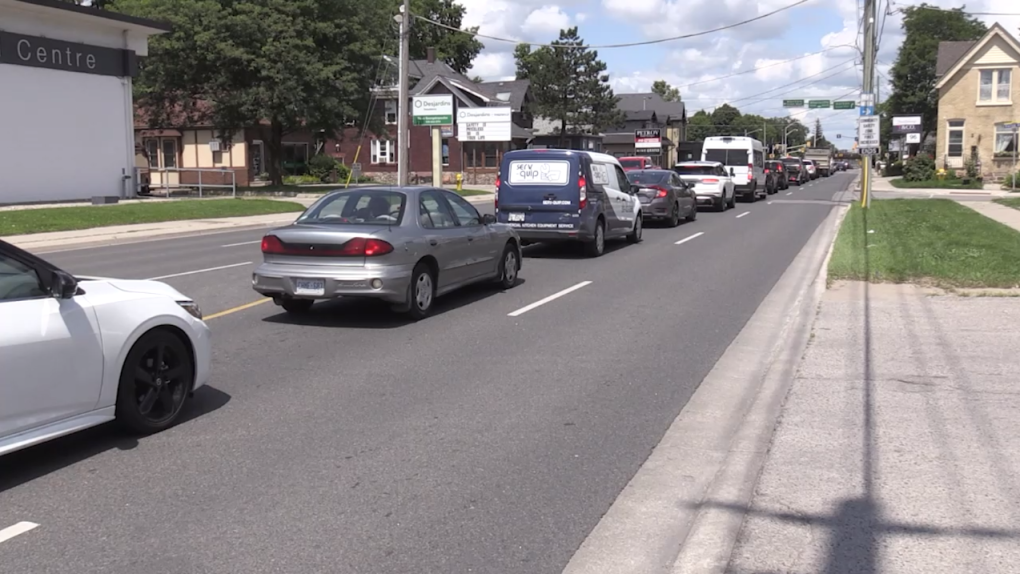Solution to Wharncliffe Road’s bottleneck delayed by decision not to fund cost increase
Roadwork to eliminate one of London’s worst traffic bottlenecks has been delayed by a decision not to fund its skyrocketing price tag.
During multi-year budget deliberations earlier this year, the mayor and council did not fund a $39.6 million increase to the cost of the Wharncliffe Road South Improvements project, which includes replacing the aged rail overpass just north of Horton Street.
Council has punted a decision on the funding to the next multi-year budget, which begins in 2028.
The new overpass would no longer require northbound drivers to merge from two lanes down to a single lane to pass beneath the tracks.
The merge has become a bottleneck that can create a line of vehicles that extends beyond Byron Avenue.
Driver Chantelle Pierson believes the long line of stopped traffic poses a hazard, “Accidents can happen because people are trying to maneuver their way in, something terrible is going to happen if it's not addressed soon.”
 Northbound vehicles line up along Wharncliffe Road after merging from two lanes into one to pass under the rail tracks on July 25, 2024. (Daryl Newcombe/CTV News London)
Northbound vehicles line up along Wharncliffe Road after merging from two lanes into one to pass under the rail tracks on July 25, 2024. (Daryl Newcombe/CTV News London)
The city’s website confirms, “The current road bottleneck at the CN Rail Bridge creates safety and operational concerns for all road users, and results in traffic in the surrounding neighbourhoods.”
Neighbour Dan Tamborro was involved in a collision at the intersection of Wharncliffe Road and Byron Avenue because the long line of cars blocked his sightline when turning left.
“You're just going to see more and more accidents happen,” he warned. “You're getting the hand signals from other drivers to turn [but] they're blind to see a car coming. And that's what happened to me.”
“We just have to pace these projects. It's a reality of the fiscal situation,” admitted Mayor Josh Morgan, who didn’t include the project for funding in his budget proposal back in January. “We have in a fast growing city. There's always going to be more projects than we can fund. Again, we recognize that this is a really important strategic asset. The project is proceeding – just on a delayed timeline.”
City staff attribute the rising cost of the project primarily to inflation and higher interest rates.
The provincial government approved the project’s Environmental Assessment in 2018, and a highly publicized dispute over acquiring the property at 100 Stanley St. was resolved in late 2020.
Morgan suggests the latest delay will be two years or less, “This project was always going to be started in the latter half of the multi-year budget, so by potentially approving it in the next one, it's a delay of maybe 18 to 24 months.”
The mayor said the city can use the additional time to seek funding opportunities from senior levels of government and finalize a cost-sharing agreement with the railway.
“The agreement with CNR will be completed in time for the decision to fund the project, and with the advantage [that] there may be an infrastructure program we could access at that point,” he added.
The acquisition of properties and relocation of utilities in the area has already been completed.
CTVNews.ca Top Stories

Canadian Olympic Committee CEO says soccer coach Bev Priestman likely aware of spying
Canadian Olympic Committee chief executive officer David Shoemaker says the head coach of the national women's soccer team was likely aware drones were used to spy on another team's practices in France.
Canada to bring home fewest Olympic medals since 2012, according to forecaster
Fewer Canadians are expected to reach the Paris podium than in the previous two Olympic Summer Games, a global data analytics company predicts.
Rain reduces wildfire activity, aids firefighters: Jasper park officials
Jasper National Park officials said Thursday night that rain over the day resulted in "minimal fire behaviour and spread."
Yukon woman narrowly escapes bear attack, credits hair clip
A woman in Yukon believes her hair clip helped save her during a bear attack.
Prince William's 2023 salary revealed in new report
Newly released financial reports show that William, the Prince of Wales, drew a salary of $42.1 million last fiscal year, his first since inheriting the vast and lucrative Duchy of Cornwall.
'I was just shocked': Jasper lodge owner on seeing property destroyed by wildfire
On Wednesday night, the owner of Maligne Lodge in Jasper, Alta., was shocked to receive a photo of her business engulfed in flames.
Mary-Ellen Turpel-Lafond likely has Indigenous DNA: report
The Law Society of British Columbia says a DNA test shows a former judge and Order of Canada recipient accused of falsely claiming to be Cree "most likely" has Indigenous heritage.
U.S. authorities have arrested 'El Mayo' Zambada, a historic leader of Mexico's Sinaloa cartel
Ismael 'El Mayo' Zambada, a historic leader of Mexico's Sinaloa cartel, and Joaquin Guzman Lopez, a son of another infamous cartel leader, were arrested by U.S. authorities in Texas on Thursday, the U.S. Justice Department said.
Harris pushes Netanyahu to ease suffering in Gaza: 'I will not be silent'
U.S. Vice President Kamala Harris pressured Israeli Prime Minister Benjamin Netanyahu on Thursday to help reach a Gaza ceasefire deal that would ease the suffering of Palestinian civilians, striking a tougher tone than President Joe Biden.






























